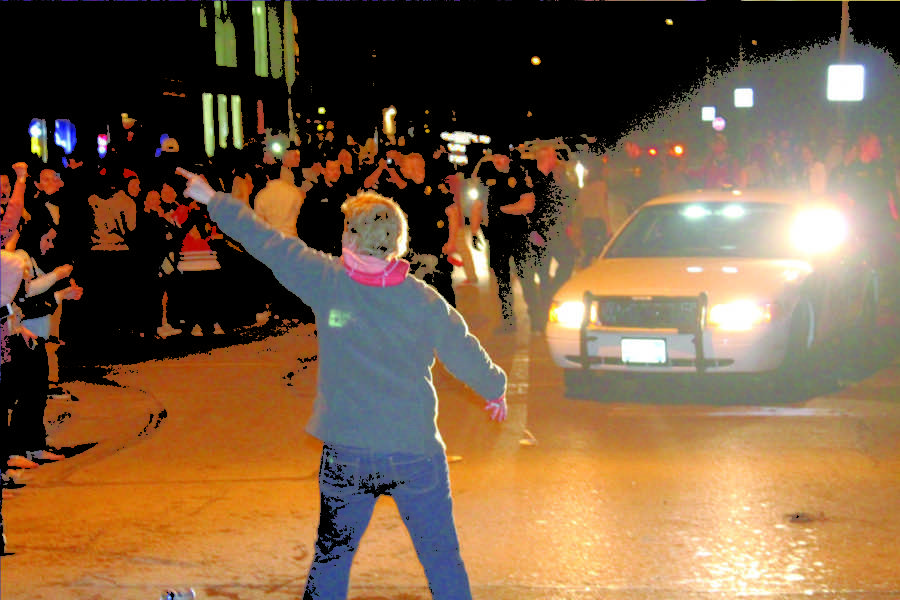Wandschneider: Pride causes riots, leads to downfall
Tiffany Herring/Iowa State Daily
All it takes is for one person to stand out and get some attention to make others want the limelight. As a result, chaos breaks out, which is exactly what happened.
April 14, 2014
Starting at a young age, we are taught to be competitive and to strive to be the best. From sports to academics, we always try and one up our competitors. There is nothing wrong with wanting to be good at something, but society has blown up this idea, which will be the downfall of society. Our most fatal flaw is pride.
C.S. Lewis says in his book, “Mere Christianity”: “Pride gets no pleasure out of having something, only out of having more of it than the next man … It is the comparison that makes you proud: the pleasure of being above the rest. Once the element of competition is gone, pride is gone.”
The pride Lewis is talking about is not the pride a proud parent feels after his or her child does something or the pride that is felt when you aced that final that you had been preparing for well ahead a time. It is the pride that hungers to be the best at everything and that will tear others down to get there.
That is where the issue lies.
Veishea is supposed to be a time to take pride in Iowa State and all of the things that happen around campus. This type of pride is similar to the pride of the proud parent, taking time to appreciate all of the accomplishments from the university and its students. Instead, destruction quickly ended the positive celebration.
It does matter what the instigator was for the riots, but pride turned them into something much worst. The bad side of pride is trying to be the best, which becomes a constant battle to one up someone else. All it takes is for one person to stand out and get some attention to make others want the limelight. As a result, chaos breaks out, which is exactly what happened.
Say the first car just got flipped. People notice and turn their attention to those involved. A prideful person in the crowd recognizes the attention received for that action and wants that same attention. Maybe that person decides to flip a bigger car or decides to tear down a sign. The cycle just repeats itself until we have a riot like the one April 8. It did not matter if the action was right or wrong, just the fact that the attention was on them.
Seeing pride in this way also happens in much more casual settings. Think about those supposedly friendly conversations you have during lunch. You share some awesome accomplishment and everyone smiles in approval. A surge of happiness flows through your veins until one of your buddies shares some accomplishment that seems to be better than yours. How dare they one up you, couldn’t they just let you have the spotlight for a little bit? As a result, you try and one up them or prove that your thing was better. This is pride talking. Instead of being happy for your friend, you feel the need to tear them down.
The scary thing about pride is that we usually don’t know that we are doing it. Often people recognize someone else’s pride but fail to see that they are prideful.
The evils of pride are witnessed in every parts of the world. Go to any part in history, past and present, and look at any society that had or currently has a dictator. With a dictator being the supreme ruler, the society revolves around that person. He is the highest being and everything is done according to that. If something threatens the idea of him being the best, actions are taken to put others down.
Pride is the one thing that causes us to end up alone. By constantly putting ourselves up but tearing others down, we are pushing people away. Nobody wants to be around someone that only talks about how much better he or she is at, well, everything.
Picture a society where everyone is prideful. With everyone trying to be better than everyone else, people are pushed away. Friendships become nonexistent.
Patching up this flaw will not happen overnight. It will take the efforts of many. A place to start is for each of us to take a step back from our lives and reevaluate our motives. Were we doing something because it was the right thing to do, or were we doing it out of pride to prove that we were better than someone else?
Lewis warns us by saying, “If a man thinks he is not conceited, he is very conceited indeed.” The first step in overcoming pride is to recognize that we are prideful and to start focusing on bringing others up, not tearing them down.

















